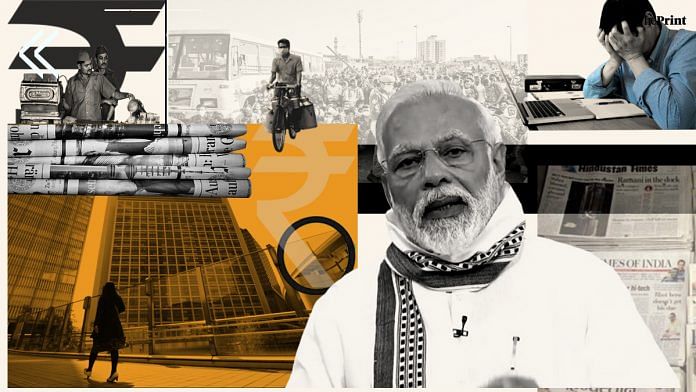PM Narendra Modi has appealed to the industry leaders to be compassionate and not sack employees as he extended the nationwide lockdown until 3 May. Migrants gathered at Bandra station, Mumbai, demanding transport arrangement to go home. Several firms have fired employees amid growing concern over demand stagnation. India Inc has been waiting for a stimulus package and industry-specific support from the government.
ThePrint asks: Can Modi govt ask companies not to sack workers due to Covid crisis or should firms decide?
Let employers and employees negotiate their relationship, which began much before this crisis came about
 Manish Sabharwal
Manish Sabharwal
Chairman, TeamLease Services
In an emergency situation, the government can ask for anything from its citizens. But whether it should ask for something after a 21-day lockdown is a different question.
Everything that the government is doing to stop the coronavirus from spreading further is killing the economy and that is the right sequence. Everybody is making sacrifices and firms are contributing their bit. But the notion that employers should not decide their relationship with employees reflects a misunderstanding of how firms work.
Companies are not oceans but rivers; they need flow and hardly ever have stock. Shareholders and banks don’t pay salaries; customers do. So if customers go on strike, there is only so much that companies can be expected to do. The notion also reflects a misunderstanding of who employers are: of the 6.3 crore enterprises in India, only 19,500 have a paid up capital of more than Rs 10 crore.
India’s labour can’t function without capital and our capital is at a disadvantage without labour because of regulatory cholesterol (the universe for employers includes 57,000 compliances, 3,100 filing and 3,000 changes a year).
So let’s be careful about our expectations from employers; we will share the pain but cannot give what we don’t have; without employers there are no employees. Let employers and employees negotiate their relationship because this began much before the coronavirus crisis and will last long after the pandemic is over.
Modi govt’s move to pass onto firms its own responsibility of helping workers during Covid crisis is short-sighted
 Narendar Pani
Narendar Pani
Professor, National Institute of Advanced Studies
The Narendra Modi government’s effort to pass onto the firms its own responsibility of protecting workers’ interests is extremely short-sighted. When the Covid-19 crisis passes, as it will, firms must be in a position to quickly tap whatever opportunities that may emerge. They will not have the resources to do so if their financial strength is destroyed in paying workers, whom the firms cannot productively employ currently.
The more far-sighted firms will undoubtedly retain a core set of workers, because they will be needed when companies ramp up their activities after the crisis. But asking firms to abandon all layoffs could leave them so weak that they might not be able to ward off international competition when the recovery begins.
A visionary government would create a fund that directly helps workers hit by the current crisis. It could finance this fund by monetising the deficit.
If it simultaneously takes steps to increase the production of those goods that the workers benefitting from this fund will demand, then the inflationary impact of monetising deficit will be minimal. It could also encourage the richer sections in the private sector to contribute a part of their CSR funds towards supporting workers affected by the crisis. The Modi government should tap the ability of a healthy private sector rather than introduce measures that make it sick.
Workers have generated surplus value for companies all these years; it’s now firms’ duty to pay back from their profits
 Aashita Dawer
Aashita Dawer
Associate Professor (Economics), Jindal Global Law School, O.P. Jindal Global University
The Indian economy has been put into deep recession due to the Covid-19 crisis. The IMF’s projected growth rate for India in 2020 is 1.9 per cent and there are real fears that the economy may slide to negative growth as well. The lives of migrant workers have already been hit hard during the 21-day lockdown.
It is important that the Narendra Modi government asks companies not to sack workers. It seems for the firms to downsize if they are not earning profits. However, what goes unnoticed is that over the years, it is these workers who have generated surplus value for the companies. During an unusual crisis, it is the duty of these companies to pay back to the workers from the profits they have made in all these years.
Moreover, if workers won’t have jobs and don’t get paid, we will be facing a downward spiral of aggregate demand in an economy that is already suffering from depressed demand and underproduction.
We may also be looking at a country with food riots, chaos, social unrest, mass scale frustration with further negative impact on their productivity. If the demand can be placed back on track along with steady supply, the economy’s growth may still maintain a decent rate.
During coronavirus crisis, govt can give incentives to companies to maintain the employee headcount
 Ashutosh Sinha
Ashutosh Sinha
Business journalist
The Narendra Modi government can request companies not to fire their employees. There is little the government can do to force its way, though.
A company is run by its board, whose decisions are executed through the CEO and other key management personnel. These decisions are taken in the interests of the various shareholders represented by the board.
Companies today have a number of temporary or contract employees who can face the axe without violating, in spirit, the government’s request. Technically, they are on the rolls of a staffing company and if they are removed from their place of work, they can be benched, that is, be without work. Benching during a slowdown is a normal phenomenon and there are several instances of that happening.
The government can follow up with incentives for companies to keep their employee headcount. Some countries such as Australia have decided to pay small companies a portion of their employee wages to tide over the situation. Keeping small companies afloat during a slowdown should be central to a government’s approach since it continues to put money in the hands of the people. A slowdown, therefore, may be partly arrested since consumption activities do not stop.
Also read: US, Australia, Japan target China on Covid-19. Should India join or act in self-interest?
By Pia Krishnankutty, journalist at ThePrint




Government should make it conditional for companies for getting soft loans from banks, or restructuring them, or getting interest payment holidays etc. – – that, they will not sack workers. They may cause some salary cuts, but not retrench them altogether.
I almost fell on the floor laughing when I read this gem, “Let employers and employees negotiate their relationship …..”. When one side has all the bargaining powers and the other, none, it is not hard to imagine the result of such, “negotiation”.
It depends on how a surplus-value is defined. If surplus-value is defined purely in the form of profits that already have been returned to shareholders through dividends or share buybacks or capital investments then I don’t see how companies can pay the employees in cash. Unless, employees are ready to take a part of surplus value in other non-cash forms like promissory notes, ESOPs, etc. The fight is about the cash and liquidity and not of the assets.
The incoming tide wets King Canute’s feet as well. No entrepreneur would be happy to let go of an employee he has recruited and then mentored with emotional investment. One speaks of a small firm, but the principle applies to the largest corporations as well. Pink slips are fluttering like confetti. Fifty million people losing their jobs in a fortnight is a rampaging herd of wild elephants no one can obstruct. The government itself cannot lay off or furlough permanent employees, but aren’t VRSes happening in PSUs. For that matter, how does one read the “ voluntary “ pay cuts government servants at all levels are accepting. We are in for a Greek style period of austerity, no doubt about that. What the government can and should be doing – something it has strangely not accorded meaningful priority to all these years – is to restore the economy to health and high growth. An ideological agenda does not put food on the tables of ordinary Indians. Hindus, any more than Muslims.
Sir, I did not understand you last sentence. “HIndus, any more than Muslims”.
Modi’s call to the companies not to sack the employees is an attempt to position himself and his government as compassionate, and position employers as ruthless. It is well and good if his government is going to foot a part of the pay bill of employers. As a person running a small office, I at a loss to understand how to pay salaries of my colleagues when I have earned no revenue since mid-March? Money doesn’t grow on trees.